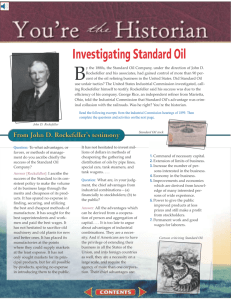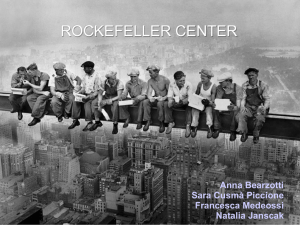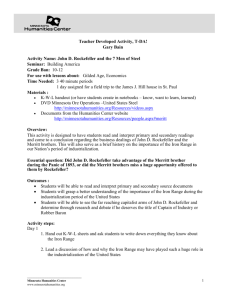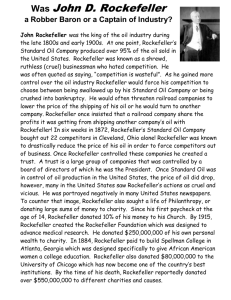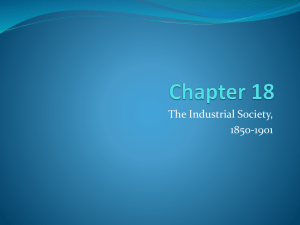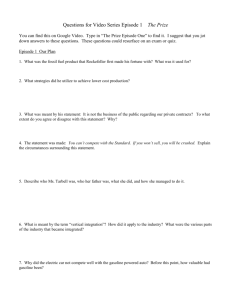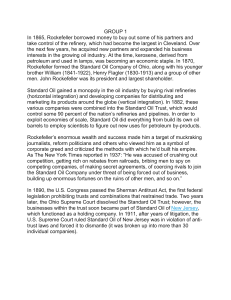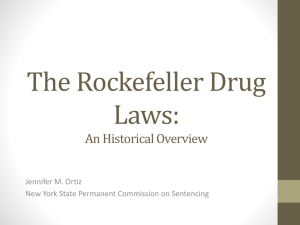Investigating Standard Oil
advertisement
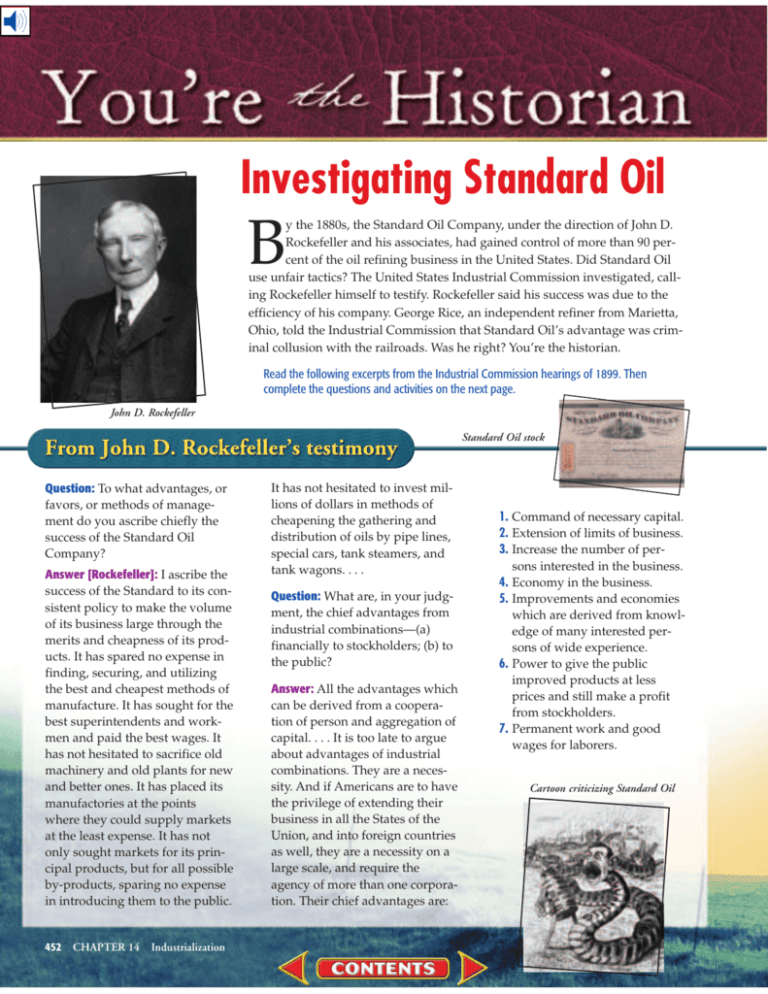
Investigating Standard Oil B y the 1880s, the Standard Oil Company, under the direction of John D. Rockefeller and his associates, had gained control of more than 90 percent of the oil refining business in the United States. Did Standard Oil use unfair tactics? The United States Industrial Commission investigated, calling Rockefeller himself to testify. Rockefeller said his success was due to the efficiency of his company. George Rice, an independent refiner from Marietta, Ohio, told the Industrial Commission that Standard Oil’s advantage was criminal collusion with the railroads. Was he right? You’re the historian. Read the following excerpts from the Industrial Commission hearings of 1899. Then complete the questions and activities on the next page. John D. Rockefeller Standard Oil stock Question: To what advantages, or favors, or methods of management do you ascribe chiefly the success of the Standard Oil Company? Answer [Rockefeller]: I ascribe the success of the Standard to its consistent policy to make the volume of its business large through the merits and cheapness of its products. It has spared no expense in finding, securing, and utilizing the best and cheapest methods of manufacture. It has sought for the best superintendents and workmen and paid the best wages. It has not hesitated to sacrifice old machinery and old plants for new and better ones. It has placed its manufactories at the points where they could supply markets at the least expense. It has not only sought markets for its principal products, but for all possible by-products, sparing no expense in introducing them to the public. 452 CHAPTER 14 Industrialization It has not hesitated to invest millions of dollars in methods of cheapening the gathering and distribution of oils by pipe lines, special cars, tank steamers, and tank wagons. . . . Question: What are, in your judgment, the chief advantages from industrial combinations—(a) financially to stockholders; (b) to the public? Answer: All the advantages which can be derived from a cooperation of person and aggregation of capital. . . . It is too late to argue about advantages of industrial combinations. They are a necessity. And if Americans are to have the privilege of extending their business in all the States of the Union, and into foreign countries as well, they are a necessity on a large scale, and require the agency of more than one corporation. Their chief advantages are: 1. Command of necessary capital. 2. Extension of limits of business. 3. Increase the number of persons interested in the business. 4. Economy in the business. 5. Improvements and economies which are derived from knowledge of many interested persons of wide experience. 6. Power to give the public improved products at less prices and still make a profit from stockholders. 7. Permanent work and good wages for laborers. Cartoon criticizing Standard Oil Oil derricks I am a citizen of the United States. . . . Producer of petroleum for more than 30 years, and a refiner of same for 20 years, but my refinery has been shut down during the past 3 years, owing to the powerful and all-prevailing machinations of the Standard Oil Trust, in criminal collusion and conspiracy with the railroads to destroy my business of 20 years of patient industry, toil, and money in building up, wholly by and through unlawful freight discriminations. I have been driven from pillar to post, from one railway line to another, for 20 years, in the absolutely vain endeavor to get equal and just freight rates with the Standard Oil Trust, so as to be able to run my refinery at anything approaching a profit, but which I have been utterly unable to do. I have had to consequently shut down, with my business absolutely ruined and my refinery idle. This has been a very sad, bitter, and ruinous experience for me to endure, but I have endeavored to the best of my circumstances and ability to combat it the utmost I could for many a long waiting year, expecting relief through the honest and proper execution of our laws, which have as yet, however, never come. . . . Outside of rebates or freight discriminations I had no show with the Standard Oil trust, because of their unlawfully acquired monopoly, by which they could temporarily cut only my customers’ prices, and below cost, leaving the balance of the town, nine-tenths, uncut. This they can easily do without any appreciable harm to their general trade, and thus effectually wipe out all competition, as fully set forth. Standard Oil prices generally were so high that I could sell my goods 2 to 3 cents a gallon below their prices and make a nice profit, but these savage attacks and cuts upon my customers’ goods, and their consequent loss, plainly showed them their power for evil, and the uselessness to contend against such odds, and they would buy no more of my oil. . . . Understanding the Issue 1. What potential advantages could companies like Standard Oil offer consumers? 2. What did George Rice believe to be the reason Standard Oil was so successful? 3. How would you assess the credibility of the two accounts? Activities 1. Investigate Today many industries, unions, and special interest groups lobby Congress for favorable legislation. What are the most powerful groups? How do they operate? 2. Check the News Are there any companies that recently have been investigated for unfair or monopolistic practices? Collect headlines and news articles and create a bulletin board display. CHAPTER 14 Industrialization 453
